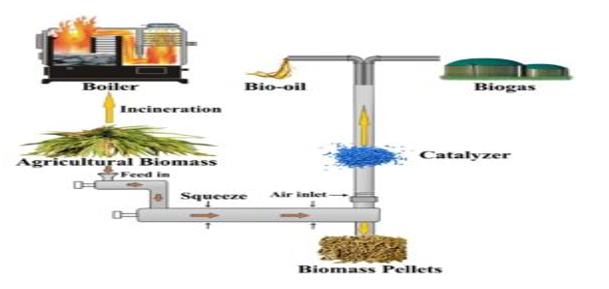INP-WealthPk
Arsalan Ali
Agricultural residues have the potential to be used as renewable energy sources in Pakistan to address energy-related challenges, including shortages and environmental concerns.

Dr Murid Hussain, energy expert at COMSATS University, said while talking to WealthPK that the utilisation of agriculture residues in Pakistan as renewable energy resources can provide a sustainable path for the country to meet the rising demand for energy. He said agriculture is the largest sector that contributes to gross domestic product (GDP). It produces large quantities of agricultural residue biomass, which is mainly underutilised as animal feed, and conventional fuel substitutes are left to rot in fields or burned.
“By efficiently managing and exploiting these feedstocks and converting them into bioenergy, Pakistan can satisfy a large chunk of its national energy demand,” he suggested. Dr Murid said the utilisation of fossil fuels (coal, petrol, and natural gas) causes the emission of greenhouse gases which pollute our environment. Pakistan primarily relies on fossil energy fuels, especially in the transportation and power generation sectors. These are major consumers of fossil fuels and emit toxic materials into the environment.
Data available from the Oil Companies Advisory Council (OCAC) shows that during the first five months (July-Nov) of the current financial year, sales of energy products were recorded at 9,858,708 MT, out of which 76% were recorded in the transport sector, while 16%, 5%, and 0.07% were recorded in the power sector, industrial sector, and agriculture sector.
He said that Pakistan's reliance on fossil fuels to meet energy demands and price fluctuations of fossil fuels cause hefty import bills. This affects the country's energy budget and requires the energy sector to find alternatives. Data available from Pakistan Bureau of Statistics (PBS) shows that the import of the petroleum group during the first five months of the current fiscal year was recorded at $7.7 billion, showing a decline of 8% compared to the same period the previous year when the import of the petroleum group stood at $8.37 billion.
He added that in Pakistan, agriculture produces approximately 81 million tons of residues that can be utilised for biofuel production. He said the utilisation of agriculture residues in Pakistan as renewable energy resources can offer a sustainable route to meeting the rising demand for energy.
Dr Murid said energy production via efficient technology can produce multiple positive impacts. First, it will help to save billions of dollars for the national exchequer by reducing the demand for fossil fuels. Second, it will help to protect the environment by reducing harmful fumes from the burning of crop residues. He said that biomass energy, solar energy, tidal power, and wind energy have been recognised as potential sources that can effectively address the need for fossil fuels.
Credit : Independent News Pakistan-WealthPk




